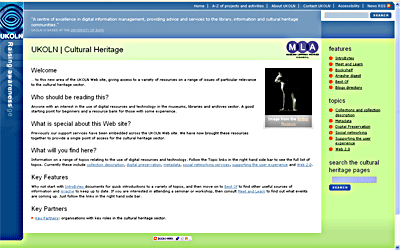Newsletter Issue 20 - December 2008
JISC to Increase UKOLN Funding Significantly from 2009
Liz Lyon
JISC has announced that it is significantly increasing its funding to UKOLN from 2009. This increase is both a mark of confidence in the work of UKOLN but also a recognition of the increasing importance of investment in a national e-infrastructure to support the UK's global competitiveness in science, research and innovation. UKOLN is a JISC Innovation Support Centre based at the University of Bath, UK and provides strategic guidance, policy and advocacy support and technical expertise for JISC activities, and thereby, to the sector as a whole. The increase in funding will ensure that UKOLN can work with the Higher Education sector and other stakeholders to test and implement technical standards and approaches to ensure information is managed and made available to support innovative research and learning in the UK. In particular this additional funding will strengthen community engagement and help to enhance deep technical capability.
Sarah Porter, Head of Innovation, JISC said “UKOLN has been central to the development of JISC digital information programmes and services; it gives me great pleasure to announce this investment that will help support the sector to respond to emerging requirements for research and learning and the opportunities that new technologies offer.”
Dr Liz Lyon, UKOLN Director said “We are delighted to be awarded this substantial increase in our core funding, which reflects our key position in supporting JISC e-Infrastructure developments. The rapid evolution of open Web content and services, institutional investments in digital repositories and associated research support requirements, provide considerable challenges to institutions and the research community today and in the longer term. We look forward to a continuing role in supporting the JISC in the implementation and delivery of its Innovation Programmes.”
UKOLN also receives core funding from the Museums, Libraries and Archives Council (MLA) and celebrated its 30th Anniversary in 2008.
Further information:
UKOLN Press Release
http://www.ukoln.ac.uk/ukoln/press/2009-01-08/
Managing Research Data
Liz Lyon
UKOLN as a partner in the DCC has been involved in a number of recent events exploring the roles and responsibilities associated with managing research data. Liz Lyon gave a presentation at a Forum meeting in Washington DC of the Association of Research Libraries and CNI on Re-inventing Science Librarianship. The talk entitled “Transition or Transform? Repositioning the Library for the Petabyte Era” described some experiences working with different research groups and the types of challenges they face in data management. The talk offered some concrete ideas on how libraries and librarians can rise to meet the challenges in the data arena. A related talk “Dealing with the Data Cloud” was given at the University of Bath where local research colleagues are similarly grappling with the challenge of managing large volumes of heterogeneous data at the institutional level.
The 2nd Research Data Management Forum (RDMF) co-hosted by the Digital Curation Centre and the Research Information Network, also focused on Roles and Responsibilities for effective data curation. The opening keynote was given by Andrew Treloar, Deputy Director of the Australian National Data Service (ANDS) and he outlined the approaches they are taking to tackle the data deluge. The series of presentations and discussions which followed illustrated the variety of roles and skills necessary within an institution or data centre to achieve maximum benefit. The importance of a multi-disciplinary team covering computational, library, preservation and domain expertise was emphasised and there is much work still outstanding to build national capacity and capability in this context.
Further information:
"Transition or Transform? Repositioning the Library for the Petabyte Era" and
"Dealing with the Data Cloud" are available at:
http://www.ukoln.ac.uk/ukoln/staff/e.j.lyon/presentations.html
Information on Research Data Management Forum
http://www.dcc.ac.uk/events/data-forum-2008-november/
The DCC Charter
Liz Lyon
The Digital Curation Centre has recently published a Charter which seeks:
- To convey key curation messages to primary stakeholders and to our wider community
- To inform and influence political positioning in the curation and preservation landscape
- To promote and publicise the DCC and curation concepts
- To facilitate the process of achieving consensus within the DCC on critical issues of identity and mission.
The Charter describes in simple terms the elements of curation, the importance and value of curating research data, the roles and responsibilities associated with curation and how it will be achieved. The Charter also describes ten Principles which the DCC is committed to follow and which include commentary on preservation standards and models, data-sharing policies, data management plans, data audits, repositories, curation tools and training.
Further Information:
The DCC Charter
http://www.dcc.ac.uk/charter/
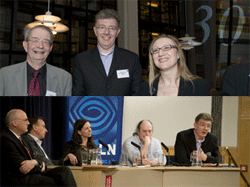
UKOLN at 30: Just some of the pictures taken at the
UKOLN 30th anniversary event held at the British Library in April 2008.
Data Audit Framework Development Project
Alex Ball
Over the summer of 2008, UKOLN participated in a project led by HATII at the University of Glasgow to develop a Data Audit Framework (DAF). The DAF is designed for UK Higher Education institutions looking to improve the way they manage the data produced by their researchers. The Framework emphasises the need to identify, locate and assess the data assets held by an institution, so it can not only make informed decisions about the infrastructure needed to store and preserve the assets, but also realise the benefits of promoting and re-using the data.
As part of the development process, a draft version of the DAF was trialled in three locations. Sarah Jones of HATII audited the Glasgow University Archaeological Reasearch Division (GUARD), Çuna Ekmekcioglu audited the School of GeoSciences at the University of Edinburgh, while Alex Ball of UKOLN audited the Innovative Design and Manufacturing Research Centre (IdMRC) at the University of Bath. While each organisation had its own issues, the three auditors found much in common both in the practical application of the DAF and the way in which data was handled at the three sites. An article about their experiences was published in volume 3, issue 2 of the International Journal of Digital Curation.
The methodology was updated in the light of the case studies and is now available for download. An online tool to assist the audit process has been developed; it and the methodology are currently being piloted at four test sites: the University of Edinburgh, King’s College London, Imperial College London and University College London. Once the lessons from these implementations have been fed back into the methodology and tool, they will be released for widespread use.
Further information:
Data Audit Framework
http://www.data-audit.eu/
Jones et al. 2008. The Data Audit Framework: A First Step in the Data Management Challenge. International Journal of Digital Curation 3(2) pp. 112-120.
http://www.ijdc.net/
The Digital Curation Centre SCARP Project
Colin Neilson
The DCC SCARP Project is investigating disciplinary attitudes and approaches to data deposit, sharing and re-use, curation and preservation. The methods adopted include immersive case studies. The first of these case studies, “Curating Brain Images in a Psychiatric Research Group: Infrastructure and Preservation Issues” was published on 18 November 2008.
Case studies are currently underway in the disciplinary fields of Architecture & Engineering, Astronomy, Atmospheric Sciences, Biology, Medical Sciences, Social Sciences. These will be published in 2009.
The project aims to develop a landscape analysis of the disciplinary setting in each field and to support the broader purpose of understanding the factors explaining and illustrating the different “digital curation” practices across the variety of disciplinary approaches over the range of knowledge domains.
The next phase of the project will aim to synthesise the analysis from the case studies to support development of appropriate curation approaches and development of best practice in digital curation. This will call on the work of colleagues in the Digital Curation Centre, making use of tools such as the DCC Lifecycle Model, to show the usefulness of the approach over the variety of disciplinary settings.
The SCARP Project will end in July 2009 and will include a conference in 2009 as a major dissemination event focusing on the spectrum of curation approaches appropriate to the needs of researchers working over the full range of disciplines, including the new lessons learnt from disciplinary working.
Further information:
DCC SCARP Project
http://www.dcc.ac.uk/scarp/
Curating Brain Images in a Psychiatric Research Group: Infrastructure and
Preservation Issues
http://www.dcc.ac.uk/docs/scarp/SCARP_B4821_NeuroCase_v1_1.pdf
The eCrystals Federation Project
Manjula Patel
![]()
This project runs from November 2008 to March 2009 aiming to establish a federation of crystallography data repositories across an international group of partner sites, with metadata harvested by a number of aggregation services. The work builds on the results of the eBank-UK Phase 3 study to: integrate and embed an open data repository approach into current research practice by engaging data centres, librarians, researchers, publishers and third-party information providers; harmonise the metadata application profiles from repositories operating on different platforms; investigate aggregation issues arising from harvesting metadata from repositories within the networked information environments; enable the federation of institutional archives to interoperate with international subject archives (IUCr and CCDC) and other third-party harvesters; develop approaches to the preservation and curation of scientific data in open repositories.
The project is led by the UK National Crystallography Service (University of Southampton) with core partners at UKOLN (University of Bath), the Digital Curation Centre (Universities of Bath & Edinburgh) and the Unilever Centre (University of Cambridge). The project currently has 14 supporting partners.
Further information:
eCrystals Project Wiki:
http://wiki.ecrystals.chem.soton.ac.uk/index.php/Main_Page
eBank-UK Project:
http://www.ukoln.ac.uk/projects/ebank-uk/
UKOLN Contribution Voted 'best peer-reviewed paper'
Alex Ball
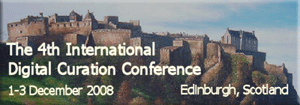
A paper entitled "Strategies for the Curation of CAD Engineering Models" co-authored by Manjula Patel and Alexander Ball of UKOLN and Lian Ding of the IdMRC, University of Bath, was voted the best peer-reviewed paper by the Programme Chairs of the 4th International Digital Curation Conference which took place in Edinburgh on 1-3 December 2008. The conference was held by the Digital Curation Centre in conjunction with the National e-Science Centre and comprised a mix of peer-reviewed papers, invited presentations and international keynote speakers.
A number of engineering firms now consider Computer Aided Design (CAD) models to be the definitive expression of their designs. While their products may be in service for many decades, their models are in closed, proprietary formats that are in danger of becoming unusable on a much shorter timescale. At the same time, contractual and competitive pressures increase the need for product information to be integrated and re-used across the product lifecycle. The paper examines these issues and proposes two technologies to supplement existing product lifecycle management techniques in order to improve both the contemporaneous exchange of and long-term access to product information.
This research was conducted as part of the EPSRC/ESRC-funded KIM Grand Challenge Project in which UKOLN is a partner, along with ten other universities and the Mechanical Engineering and Management Departments of the University of Bath.
The paper itself and the slides accompanying the presentation are available from the conference Web site. A version will also be published in the International Journal of Digital Curation in due course.
Further information:
4th International Digital Curation Conference
http://www.dcc.ac.uk/events/dcc-2008/
UKOLN project page for the KIM Grand Challenge Project
http://www.ukoln.ac.uk/projects/grand-challenge/
International Journal of Digital Curation Publishes Winter Issue
Issue 2, Volume 3 of The International Journal of Digital Curation was published just before the opening of the 4th International Digital Curation Conference. The peer-reviewed papers offer a variety of topics. They include an exploration of data practices in the long-standing Long Term Ecological Research (LTER) setting, a description of experiences in the area of curating engineering information, how one group has dealt with migration problems in a long-term archive of US Government Printing Office datasets, a description of tools from the SCOPE (Scientific Compound Object Publishing and Editing) system which is designed to enable scientists to author, publish and edit scientific compound objects, together with research analysing the current parlous state of preservation of computer games in the UK. General articles include reports from iPRES 2008 and the 3rd Annual WePreserve Conference, experience from American Memory, another covers an international copyright study with implications for curation and preservation, while another describes steps being taken in Australia to establish a national distributed data service. We have also received articles from DCC staff working on both the Digital Audit Framework and DRAMBORA.The IJDC is produced by UKOLN on behalf of the Digital Curation Centre.
Further information:
International Journal of Digital Curation
http://www.ijdc.net/
JISC IE Technical Review
Paul Walk
UKOLN has been commissioned to undertake a technical review of the JISC Information Environment, starting immediately in 2009. This work will be co-ordinated by Paul Walk. The JISC Information Environment is a long-running programme of planned activity and funded project work and has a broad scope in the areas of resource-discovery and use.
While the technical underpinnings of the Information Environment (largely developed by Andy Powell, then at UKOLN) have proven to be remarkably future-proof, the time has come for a thorough review. There have been significant changes in the landscape of resource discovery in the last few years, such as the rapid emergence of greater user-participation in Web services. The Information Environment needs to be re-focused to exploit them successfully.
UKOLN plans to undertake this review in two phases: a rapid, limited first-pass review, followed by an extensive public review process. It is intended that the highly regarded and successful MODELS workshops of the late 1990s be used as a blueprint for a similar approach to community engagement in the review process.
This work will be iterative, and should be completed by July 2009. However, part of the remit of this project is to consider how an ongoing, continuous process of review can be introduced.
Further information:
Paul Walk p.walk@ukoln.ac.uk
Update from the Repositories Research Team (RRT)
Mahendra Mahey
There have been a few staff changes since our last contribution to FOCUS. Julie Allinson left the team to become Digital Library Manager at the University of York and was replaced by Adrian Stevenson formerly of Learning Technology Services Team at the University of Manchester. Rachel Heery (formerly manager of RRT) took early retirement and Michael Day from UKOLN has joined the team in a management capacity. Some of the staff are still based in CETIS in Glasgow and Edinburgh, namely John Robertson, Lorna Campbell and Phil Barker.
The majority of our time recently has been spent on synthesising and summarising the main findings from the outputs of the JISC Repositories and Preservation Programme (06-09). The results are being published via a blog which will soon be available for public access.
The team has also published a report entitled ‘An ecological approach to repository and service interactions’ which investigates the use of ecological metaphors to describe the complex interactions between digital repositories. The report will be available via the UKOLN-hosted JISC Information Environment Repository and is supported by a recent article in Ariadne. There is currently work writing up specific case studies on how the approach may help certain areas.
Work on phase 2 of the SWORD Project has continued as does engagement with the OAI-ORE initiative.
Further information:
Repositories and Preservation programme:
http://www.jisc.ac.uk/whatwedo/programmes/reppres.aspx
IE Repository
http://ie-repository.jisc.ac.uk
A Bug's Life?: How Metaphors from Ecology Can Articulate the Messy Details of Repository Interactions
http://www.ariadne.ac.uk/issue57/robertson-et-al/
SWORD (Simple Web service Offering Repository Deposit)
http://www.ukoln.ac.uk/repositories/digirep/index/SWORD
Open Archives Initiative Protocol - Object Exchange and Reuse
http://www.openarchives.org/ore/
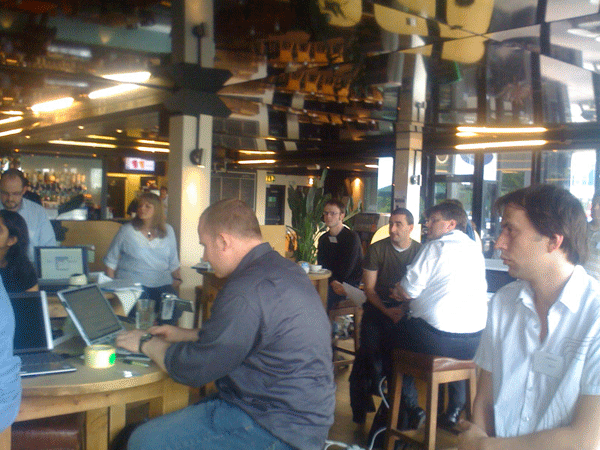
Quick-fire presentations, "elevator-pitches" and rapid prototyping were the order of the day at the CRIG/IE Demonstrator DRY Barcamp, hosted by UKOLN at the University of Bath in June. You can read a full account of this event in Ariadne, issue 56.
Forthcoming Events
Natasha Bishop
SUETr Advocacy & Cultural Change Event
22 January 2009
York
http://www.ukoln.ac.uk/events/suetr-advocacy-2009/
SUETr Embedding Repositories Event
10 February 2009
Lincoln
http://www.ukoln.ac.uk/events/suetr-embedding-repositories-2009/
SUETr Repository Policy Event
18 February 2009
National Library of Wales, Aberystwyth
http://www.ukoln.ac.uk/events/suetr-repositories-policy-2009/
JISC Conference
24 March 2009
Edinburgh
http://www.jisc.ac.uk/events/2009/03/jiscconference09.aspx
Institutional Web Management Workshop (IWMW) 2009
27-29 July 2009
University of Essex
http://www.ukoln.ac.uk/web-focus/events/workshops/webmaster-2009/

The iLab Centre, University of Essex, venue for IWMW 2009.
JISC Libraries of the Future
UKOLN will be responsible for the events organisation in this project which is a collaboration between JISC, SCONUL, RLUK and RIN. This will encompass up to 12 small workshops throughout the UK over the period of a year.
http://www.jisc.ac.uk/librariesofthefuture
SUE/SIS Repository Integration
Julian Cheal
JISC has deployed technical development at UKOLN to support the integration of repositories in the Start up and Enhancement (SUE) strand of its Repositories and Preservation Programme with the Shared Infrastructure Services (SIS) of the JISC Information Environment.
The primary audiences for this work are repository administrators and repository managers. The end-goal is to produce tools that repository managers can incorporate into their repositories with relative ease. SUE repository projects are using a variety of repository platforms, however the focus of this project is on EPrints and DSpace as they are the most frequently used.
The project sets out to develop integrations between Shared Infrastructure Services and a variety of digital repository software problems. It also seeks to exploit overlaps with other JISC-funded initiatives such as CRIG and the IE Demonstrator. Within this remit the project has two strands: finding out what the repository managers consider to be useful; and then testing any solutions and documentation with repository managers. As dissemination is a large part of this project it is going to make use of a blog and wiki.
So far the project has started to investigate SWAP to see if it is possible and useful for the repository community. Currently the WRAP Project at the University of Warwick has integrated SWAP with EPrints, a site visit has been arrange for the new year in order to gain better understanding of the project’s implementation of SWAP. Furthermore Ian Stuart at Edina has developed an AJAX interface to Sherpa Romeo as part of his work with the Depot Project. This interface is being developed so that it can be easily deployed in EPrints and DSpace.
The aim for 2009 is to have code which will help to integrate SIS into the repository development of the Start Up and Enhancement projects along with documentation to instruct repository managers on the deployment of any solutions developed.
SUETr Delivers
Pete Cliff

SUETr is a project set up to identify the training needs of JISC's Repository Start-Up and Enhancement (SUE) project staff and then deliver a short series of workshops to help address these needs. The project commenced with a survey of all SUE projects asking staff with which areas they felt they needed help. This consultation identified several key areas: embedding institutions in repositories; achieving cultural change; Intellectual Property Rights; interoperability; advocacy; user requirements; and sustainability. The highly praised workshop series commenced in October 2008 in Northampton with an event on Copyright and Repositories, in collaboration with the Repository Support Project. In December 2008 SUETr gave a workshop on interoperability to a mixed audience of repository managers, software developers and even commercial software vendors at the LSE Library, London. The workshop series continues into the first quarter of 2009 and the other training workshops are either already open for registration or will shortly be. While SUETr is designed as a programme of training for repository managers from SUE projects, it is safe to say that the events, like UKOLN’s other activities in the repository domain, are benefiting the community as a whole.
Further information:
SUETR weblog
http://jisc-suetr.blogspot.com/
SUETr Interoperability Event, December 2008
http://www.ukoln.ac.uk/events/suetr-2008/programme/
SUETr Advocacy & Cultural Change Event, 22 January 2009
http://www.ukoln.ac.uk/events/suetr-advocacy-2009/
Update on IEMSR
Emma Tonkin
The Information Environment Metdata Schema Registry project has seen many changes this year. New versions of our original software packages have been completed and are currently undergoing user testing. A further software package, designed as a reference implementation that other developers wishing to make use of the service can easily reuse and adapt, is currently in the latter stages of development. Furthermore, 2009 will see a complete graphical revamp; we expect to roll out a new look across the service during the first months of this coming year, along with the first signs of our projected new direction. In the future, IEMSR is expected to take a more community- and user-friendly approach to metadata schema registration and description, and become more tightly integratable with real-world use cases and datasets.
The ideas currently driving the IEMSR project arise in part from the work of the DCMI Metadata Registry Task Group. The Group has been reviewing the findings of various registry projects in order to see which principles are emerging from our joint experience. The project also owes a debt of thanks to the enthusiastic community who took part in the recent Registry Bar Camp which took place during the 2008 DCMI Conference in Berlin, Germany, and who did so much to make the event a success. The participants’ positive engagement served to reassure the organisers that informal events and unconferences can have a legitimate role in building a strong community.
Further information:
IEMSR
http://www.ukoln.ac.uk/projects/iemsr/
DCMI
Registry Task Group
http://wiki.metadataregistry.org/DCMI_Registry_Community
JISC PoWR: Supporting Preservation of UK HE Web Resources
Marieke Guy
In 2008 UKOLN participated in the JISC-funded PoWR (Preservation of Web Resources) Project with the aim of producing a series of guidelines on best practice in the preservation of Web resources in UK academic institutions. The project, which ran for 5 months from April to September 2008, established a blog and organised a series of workshops. It proved a successful collaboration between UKOLN and ULCC's Digital Archives, a partnership that brought together expertise from the Web management and digital preservation fields.
The workshops had two primary aims: Firstly to bring together a number of different communities to whom Web resource preservation is of potential importance. This was achieved; the three workshops held over the summer in London, Aberdeen and Manchester were well attended by a wide range of professional groupings, including the Web Management and Records Management communities. Secondly, to gain a better understanding of the challenges institutions face in preserving Web content and in doing so obtain feedback on the chief project goal: the JISC PoWR handbook.
The resulting handbook is now available and offers a wealth of tips and information for Web managers, data professionals and those making decisions concerning the long-term preservation of online resources. With such vast quantities of digital data available on or via the Internet, the JISC-PoWR handbook encourages institutions to see the requirement for coherent preservation strategies. Key issues include prioritising what to keep, how to keep it, which preservation policies to implement, the consequences of preservation decisions and how to provide sustainable access for the future.
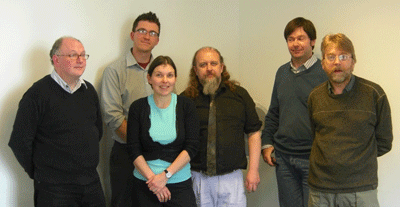
The JISC-PoWR team from left to right: Ed Pinsent, ULCC; Jordan Hatcher, OpenContentLawyer;
Marieke Guy, UKOLN; Kevin Ashley, ULCC; Richard Davis, ULCC; Brian Kelly, UKOLN.
Although the project has been formally completed, the interest of the project team in the area of preservation continues. The team has agreed that it will continue to publish posts on the project blog until at least Easter 2009.
Further information:
JISC PoWR Blog
http://jiscpowr.jiscinvolve.org/
JISC PoWR Handbook
http://jiscpowr.jiscinvolve.org/handbook/
The Application Profiles Support Project
Talat Chaudhri
The AP Support Project seeks to support and co-ordinate the deployment and continued development of the various Dublin Core Application Profiles (DCAPs) that have been created through JISC funding for different types of repository content. The intention is to encourage interoperability between different resource types through the adoption of appropriate standards where it may be of practical benefit to the repository community. The project is focussed on the following application profiles:
- Scholarly Works Application Profile (SWAP)
- Images Application Profile (IAP)
- Geospatial Application Profile (GAP)
- Learning Materials Application Profile (LMAP)
- Time-Based Media Application Profile (TBMAP)
- Scientific Data Application Profile (SDAP)
Working with repository managers and the developers of the major repository platforms, the project aims to assess the feasibility of complex metadata models in institutional repositories in terms of acquiring and maintaining high quality metadata, as well as the potential for developing new services on the basis of a common core metadata set and model for application profiles. As SWAP is the best established and most of the DCAPs are in varying stages of development, it is anticipated that this will be reflected in the feasibility study and testing.
Further information:
Application Profiles
http://www.ukoln.ac.uk/repositories/digirep/index/Application_Profiles
Engineering from the Evidence
Emma Tonkin
The design of a user-friendly metadata schema registry has caused a great deal of thought and discussion on the subject of the engineering process in general, and how best practice in engineering may apply to the development, evaluation and periodic revision of knowledge management artefacts such as controlled vocabularies, application profiles and ontologies. Some results of this discussion were presented at the recent knowledge management conference, ICKM, co-located with the ASIS&T Annual Meeting 2008 in Columbus, Ohio.
This is an increasingly popular research focus. It is also an interdisciplinary subject, in particular because different areas of knowledge management and library science tend toward separate but parallel research and development. However, as the number of new application profiles and vocabularies continues to grow and institutions begin to adopt them for practical purposes, these engineering processes become more important. They enable the individual or group responsible for an artefact to chart its progress and any pitfalls involved in its use. Furthermore, the repository or application manager responsible for its use in a given institutional and usage context benefits from the ability to closely track real-world usage patterns and make corrections in interface, recommend training, improve documentation, as well as recommending changes to the authority responsible for publishing the artefact.
In practice, enabling such feedback to be collected requires not only good communication between individuals and a strong community, but also the existence and use of tools that can support this process.
Further information:
ICKM 2008 programme
http://www.ickm2008.org/ICKM%202008%20Program.pdf
Paper extended abstract
http://www.cs.bris.ac.uk/Publications/Papers/2000928.pdf
EnTag: Enhanced Tagging for Discovery Project
Koraljka Golub
The EnTag Project explored the combination and comparison of controlled and folksonomy approaches to semantic interoperability in the context of repositories and digital collections. The aim was to investigate the effect on indexing and retrieval when using only social tagging versus using social tagging in combination with a knowledge organization system. Two different contexts were explored: tagging by readers (Intute) and tagging by authors (Science and Technology Facilities Council (STFC)). The major development was that of Intute.
For each of these activities a separate demonstrator was developed, one operating on data extracted from Intute, and the other operating over STFC’s repository in which tagging was conducted by authors submitting papers to the repository. A user study was conducted for each demonstrator, which allowed a general comparison of a repository versus digital collection context, a different knowledge organization system, interface and user community.
The results showed the importance of controlled vocabulary suggestions to produce ideas of tags to use, to make it easier to find focus for the tagging, to ensure consistency and retrieval, etc. Furthermore, the value and usefulness of the suggestions proved to be very dependent on thir quality. The suggestions must be user-oriented as regards level of specificity, perspective and currency. The participants themselves could also see the point of adding terms for information retrieval purposes, and the advantages of consistency of retrieval if the terms used were from an authoritative source.
In conclusion, we recommend that social tagging be allowed in the JISC context (e.g., repositories), enhanced with suggestions from a controlled vocabulary. More findings are needed so it is important to further analyze, experiment and pilot test tools deriving from both Intute and STFC demonstrators.
Further information:
EnTag Project Web Site 2008
http://www.ukoln.ac.uk/projects/enhanced-tagging/
Intute Repository Search
Monica Duke
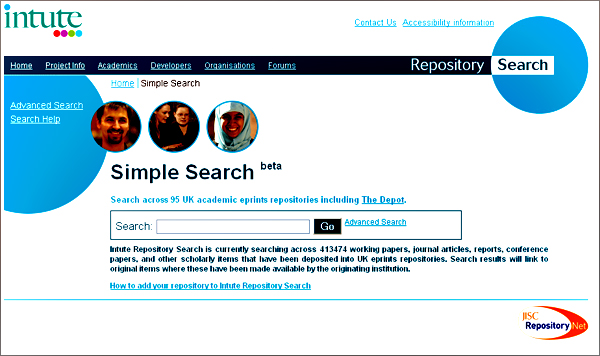
UKOLN has been involved in the development of a search service for UK institutional repositories for a number of years, initially through the ePrints UK project, and more recently its successor, the Intute Repository Search Project.
Intute Repository Search is a JISC-funded service set up to develop a UK repository search infrastructure, supporting academic activity. Increasingly, researchers are making their work freely available on the Internet by depositing their research output into institutional and other related repositories. The aim of the project is to provide the research community with access to the research outputs across UK Higher Education repositories, mainly through search and discovery services. The project has a remit to investigate innovative solutions to cross-repository exploration.
The project offers a basic and advanced Web search interface, which has recently been augmented by proof of concept demonstrators. The latter include work with NACTEM, a JISC-funded centre for text-mining, to apply text-mining techniques and full-text indexing.
UKOLN has concentrated on providing a scalable and flexible architecture for aggregating metadata from institutional repositories that support the OAI-PMH protocol. This provides the basis for building end-user services (like search), by creating and maintaining a store of metadata, and making it available to third parties. It is designed to work with other elements of the UK repository infrastructure, such as OpenDOAR, which provides lists of UK repositories through its API. Support for repository managers will also be developed through reporting interfaces, which will allow them to monitor the activity of the metadata store and the presence of their repository content in it.
The Intute repository search project values stakeholder involvement in shaping the project and input from interested parties (academics, repository developers and research or academic organisations) is invited through the project forums which can be found on the project Web page.
Further information:
Project Page
http://www.intute.ac.uk/irs/
Search Service
http://www.irs.intute.ac.uk/IRSUI/
Conceptual Search
http://www.intute.ac.uk/irs/demonstrator/
UKOLN Workshops for the MLA Community
Brian Kelly
During 2008 UKOLN ran a whole series of workshops for the museums, libraries and archives community which were designed to familiarise the sector with the key Web 2.0 and the Social Web concepts. The workshops provided participants with an opportunity to try out some of the key services and to provide an opportunity for practitioners to discuss ways in which such services and approaches could be exploited. The sessions also explored some of the barriers to effective use of Web 2.0 and outlined ways in which such barriers could be best overcome.
A number of the workshops were hosted by MLA Regional Agencies and others by professional bodies (e.g. the Society of Archivists), cultural organisations in Scotland (ASVA) and Wales (CyMAL). Alternatively they accompanied large-scale international conferences designed for the sector (e.g. ILI 2008 and the Museum and the Web 2008).
Notably the workshops did not provide a simple one-way transfer of experiences and expertise. Although the workshop facilitators were able to share our experience and advice on best practice, we were also able to tap into a wealth of related expertise from the sector, through invited co-facilitators and contributors. In addition to such formal contributions to the workshops, the workshop participants also actively engaged with the workshop activities, sharing experience of local uses of Web 2.0 and discussing further ways in which Web 2.0 could be used in a cultural heritage setting.
These discussions played an important role in shaping many of the IntroByte briefing documents which were either initially evaluated at the workshops or were developed in response to areas of interest identified at the workshops.
It should also be noted that we sought to make use of wikis to capture feedback from the various discussions groups throughout the year. This has provided a valuable resource which contains useful information on the variety of ways Web 2.0 might be used, as well as information on potential barriers to use of Web 2.0. We will be analysing this information and providing a summary of the recurring themes.
Further information:
UKOLN Cultural Heritage: Past Events
http://www.ukoln.ac.uk/cultural-heritage/events/past-events/
New Cultural Heritage Web Pages
Ann Chapman
Material of interest to the cultural heritage sector has been available from the UKOLN Web site for some time. Previously dispersed around the site, these materials have now been made available via a single point of access. These pages are intended for anyone with an interest in the use of digital resources and technology in the museums, libraries and archives sector; they also provide a useful starting point for beginners and a resource bank for those with some experience. Site development in 2009 will see further content added to existing sections as well as new features.
IntroBytes provide quick introductions to a variety of topics. These have been developed as resource materials for workshops run for the sector and further events will lead to more documents being added to the resource bank. The Meet and Learn section not only lists forthcoming events but also provides links to pages on past events and their associated resources. Topic pages bring together basic information on a topic and links to the best resources for further information. Two features draw on content from the e-journal Ariadne published by UKOLN: the Ariadne Digest picks out articles of special interest to the sector, while the Bookshelf feature draws on book reviews from Ariadne while also demonstrating the potential use of a free service. The Best Of section aims to identify examples of best practice in blogs, discussion lists and e-journals, and the Blog Directory lists a range of blogs now published in the cultural heritage sector.
Further information:
UKOLN / Cultural Heritage
http://www.ukoln.ac.uk/cultural-heritage/
Library & Information Update on Resource Description and Access
Ann Chapman
Ann Chapman contributed a feature article to the September 2008 issue of Library & Information Update on Resource Description and Access (RDA), the new cataloguing code due to be published – as an online resource – in 2009. RDA has been designed to be applicable in both digital and print-based information environments, with the potential to be included as an integral part of library management systems cataloguing modules. The development process has generated much (sometimes heated) discussion about not only specific rules but also the underlying reasons for including specific types of information. Ann chairs the CILIP/BL Committee on RDA, which represents the views of the UK library and information community in the process of developing Resource Description and Access (RDA).
Further information:
RDA: a cataloguing code for the 21st century, Library & Information Update 7(9) pp. 28-30
Full text available online at:
http://www.cilip.org.uk/publications/updatemagazine/archive/archive2008/september/rdachapman.htm
UKOLN Energy Champion Report
Eddie Young

Energy saving has increased in importance within UKOLN with an energy report being presented every month to the Operations Group. This primarily outlines the travel taken by UKOLN staff in the course of their work. This provides both a report on UKOLN international outreach but also helps to audit the organisation’s carbon footprint with respect to attendance workshops and seminars.
Travel has not significantly increased, probably as much to do with staff awareness of the issues as anything else, and electricity consumption has reached a base figure. Because of the kind of organisation UKOLN is, there is only so much we can do in some of these areas, although perhaps we do have more freedom than some, and are able to try new technologies to minimise consumption, such as cloud computing, as well as virtualisation.
We are also continuing to explore alternatives to travel, such as using video conferencing, although it seems unlikely it will completely replace attendance at international conferences in the short term. The University of Bath where UKOLN is based provides some first class video conferencing facilities. Moreover it may prove useful to emulate on a smaller scale for our own use (at short notice if need be). We are also trying to support our remote workers more by recording (videoing) UKOLN seminars, thereby reducing the need for remote workers to travel to attend these sessions, as well as making them available to a broader audience.
Aside from travel and related CO2 emissions, our efforts in saving electricity can only really be measured as a part of the University as a whole. Looking at the figures if we compare August to October 2008, with the same period in 2007, power consumed by the whole University is down by 274 000 kWh (worth some £33,000, representing a 4% reduction) and water usage is down by 4% too. UKOLN’s contribution to this effort has been through reduced use or aggregation of equipment.
The University energy manager, Peter Phelps has provided a useful document outlining energy saving procedures that is used in new staff induction. All staff are now aware of the importance of saving energy, from both a financial and environmental viewpoint.
The basics, such as switching desktops off at night and turning off lights when not required now seems to be second nature, which has made a significant difference.
More work does need to be done, particularly in the management of the servers. We have recently bought a number of new servers which we are using to simplify our existing system. The intention is to reduce what we need to rely on to work efficiently as an organisation. It may seem paradoxical to buy more equipment in order to reduce the amount of equipment we use, but the new systems will be more efficient in terms of energy consumption and performance.
Further information:
University Cuts Energy consumption
http://www.thisisbath.co.uk/news/Uni-cuts-energy-consumption/article-516176-detail/article.html
University Estates Report 2008
http://www.bath.ac.uk/news/2008/12/2/estatesreport.html
Cloud Computing
http://en.wikipedia.org/wiki/Cloud_computing
http://uk.youtube.com/watch?v=6PNuQHUiV3Q
Energy Use at The University of Bath Induction
http://www.bath.ac.uk/estates/energy/energyandsustainability.pdf
Promoting and sustaining energy efficiency across the University and
across Bath:
http://www.bath.ac.uk/estates/energy/energysavingproject.shtml
The Big Energy Challenge:
http://www.bigenergychallenge.org/
University Carbon Management summary
http://www.bath.ac.uk/estates/energy/carbonsummary.shtml
University of Bath Department of Estates
Energy, environment & sustainability: what can I do?
http://www.bath.ac.uk/estates/energy/whatcanido.shtml
University of Bath Department of Estates
Energy, environment & sustainability
http://www.bath.ac.uk/estates/energy/
UKOLN Seminars
For several years now UKOLN has held an annual series of seminars into which it also inserts a number of internal speakers on matters most directly related to staff work. This year has seen another programme with a broad range of work and interests which have done much to keep us informed and abreast of emerging developments.
To give a brief notion of the variety of presentations, we summarise quickly most of the 2008 programme. The year began with a presentation from Kara Jones, University of Bath Library, on her current work related to the development of the University’s institutional repository. Cameron Neylon, STFC Rutherford Appleton Laboratory, and School of Chemistry, University of Southampton gave a presentation on “open” approaches to research practice entitled “Open Science: Not for beginners but by beginners”.
In the spring, Grace Agnew, Associate University Librarian at Rutgers University Libraries, New Brunswick, New Jersey, gave a talk about repository developments at Rutgers University while Tim Tamminga from Digital Commons and Robin Beecroft of the Berkeley Electronic Press talked about hosted digital repository solutions and the work that Digital Commons and The Berkeley Electronic Press is doing. During the summer Anthony Beitz who is working on the Archer Initiative in Australia kindly paid a visit to Bath while touring the UK and presented an overview of the Archer project to members of UKOLN. Jean-Claude Bradley from Drexel University gave a talk entitled "Open Notebook Science Using Social Software" and described the UsefulChem Project, designed to report ongoing research within a research group working on the development of anti-malarial and anti-tumour agents.
In the autumn this year, Eric T. Meyer and Kathryn Eccles of the Oxford Internet Institute, University of Oxford gave a presentation entitled "e-Research, the Oxford Internet Institute, and Gauging the Impact of Online Scholarly Resources" while Ying-Hsang Liu, The School of Communication, Information and Library Studies (SCILS) at Rutgers University, gave a talk entitled “Do Human-Developed Index Terms Help Users?” relating to an experimental study of MeSH terms in biomedical searching. In addition, Aida Slavic gave a seminar entitled "And how golden is your retrieval? Managing words, meaning, aboutness". Dr. Aida Slavic is one of the associate editors of the Universal Decimal Classification (UDC Consortium) and visiting lecturer at the Department of Information Sciences at the University of Zagreb, Croatia. Victor Henning of Mendeley Ltd. spoke on “Mendeley - Research Paper Management 2.0”. Mendeley is free, user-friendly research paper management and sharing software. Frances Boyle, Executive Director, Digital Preservation Coalition spoke on “Digital Preservation Coalition - What's That All About?”, providing background to the DPC and an overview of its new Strategic Plan 2009-2011. The autumn sessions were completed by the visit of Dr Andrew Treloar, Deputy Director, Australian National Data Service (ANDS)/Monash University who gave a presentation entitled “The Australian National Data Service - from Planning to Operation” which described the genesis of ANDS, the context (Australian and International) within which it was created, the business plan for the first year, and the long-term vision.
The year’s seminars were finished off in December by the visit of Vanda Broughton, Senior Lecturer in the School of Library, Archive and Information Studies at University College London (UCL). Her research interests are centred on faceted classification and its application, particularly in digital environments. She is joint editor of the Bliss Bibliographic Classification 2nd edition, Associate Editor of the Universal Decimal Classification, and Chair of the UK Chapter of the International Society for Knowledge Organization.
Arrangements for the 2009 series have already begun and we are delighted to be able to welcome Prof Paul Sturges, Emeritus Professor of Library Studies, Loughborough University in February and Vincent Smith, Cybertaxonomist, Entomology Department, Natural History Museum who visit UKOLN in March 2009.
Staff News
Sally Lewis
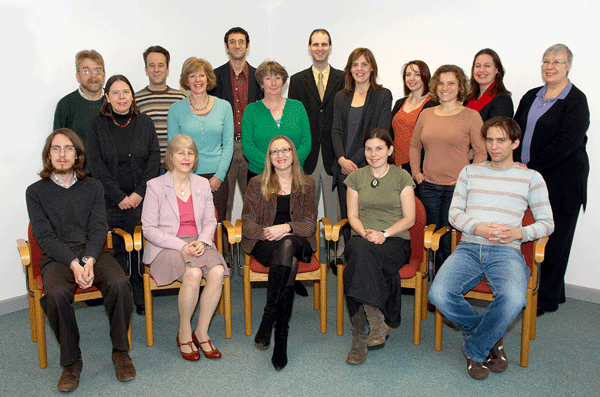
UKOLN Staff members, standing, from left to right: Brian Kelly, Ruth Burt, Paul Walk, Ali Cook, Talat Chaudhri, Bridget Robinson, Alex Ball, Sally Lewis, Michelle Smith, Koraljka Golub, Natasha Bishop, Shirley Keane; seated from left to right: Julian Cheal, Ann Chapman, Liz Lyon, Marieke Guy, Mark Dewey.
During 2008 we have welcomed five new members of staff.
In January Adrian Stevenson joined UKOLN, to work with the Repositories Research Team – a collaboration between UKOLN and JISC CETIS to support the JISC Digital Repositories Programmes. Adrian is working remotely from his home in Manchester. Talat Chaudhri and Julian Cheal were recruited in September. Talat joins the R&D Team where he is supporting and co-ordinating the development of application profiles for repository content, and Julian is a systems developer, working with JISC to support its shared infrasructure and repository services. In December Nicola Thomas joined the Software & Systems Team as Technical Services Co-ordinator, and Sarah Hext joined the Resources & Administration Team as Finance Co-ordinator.
Staff moving on during the year were Maureen Pennock, who has taken up a position with the British Library in Boston Spa; Jenny Taylor who retired from her post providing financial support across many of our projects, and in particular, the DCC. Pete Cliff will also be leaving UKOLN at the beginning of 2009 for new challenges in Oxford. We wish them all the best for the future.
Following the retirement of Rachel Heery, at the end of 2007, Michael Day was appointed to the post of R&D Team Leader in June 2008.
Further information:
UKOLN Staff pages:
http://www.ukoln.ac.uk/ukoln/staff/
Ariadne Web Magazine
Once again UKOLN has published four issues of Ariadne Web Magazine in 2008 with a wide range of articles on topics of interest to information professionals in archives, libraries and museums in all sectors. Its most recent issue includes a discussion of the tensions between copyright, the quest for prestige and cost control in open access publishing as well as the second of two articles on the nature, benefits and drawbacks of remote working in which the author focuses on the technologies that support this emerging form of employment. There are, among others, articles on implementing e-legal deposit from a British Library perspective, social media search engines, SeeAlso - a simple linkserver protocol and a description of OAI-ORE and how it can contribute to digital preservation activities.
The Winter 2009 issue will carry among others articles on preserving local archival heritage for ongoing accessibility, how the University of Strathclyde is choosing to give priority to e-content and services instead of a new building, URIs and why they matter as well as reviews of Presentation Zen: Simple Ideas on Presentation Design and Delivery and Integrating Geographic Information Systems into Library Services: a Guide for Academic Libraries. These are just a sample of Issue 58. If you have a topic of interest to Ariadne readers, do contact the editor to discuss how it might be published in the Magazine.
Further information:
Ariadne Web Magazine
http://www.ariadne.ac.uk/
http://www.ariadne.ac.uk/information/
Contact: ariadne@ukoln.ac.uk
Focus on UKOLN: Editor r.waller@ukoln.ac.uk
